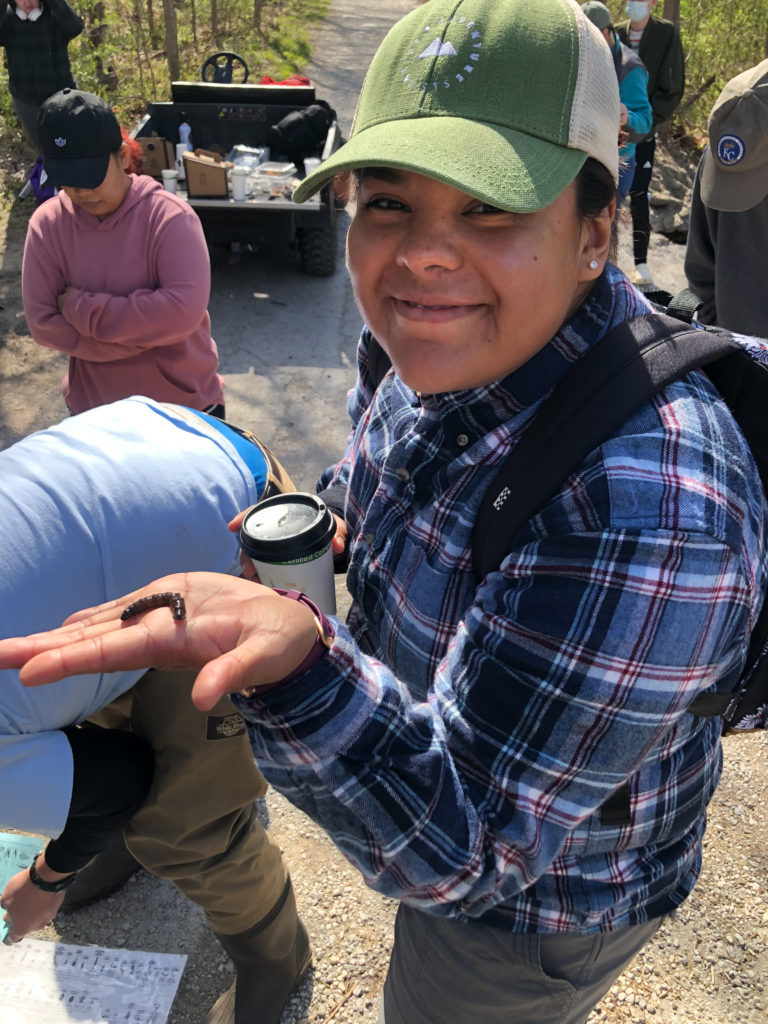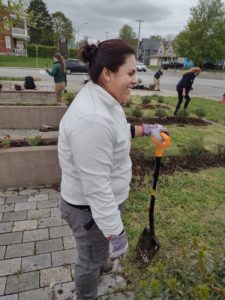
Magali with an invertebrate friend. Photo provided.
Adventure Scientists is thrilled to share this essay from friend of the organization Magali Rojas. Magali and friend Aida Winters helped to demonstrate protocols for our Timber Tracking: Eastern Black Walnut training in 2021. She works with the Heartland Conservation Alliance.
My name is Magali Rojas, I am from Kansas City, Missouri which is right next to Kansas City, Kansas. The name “Kansas City” was used twice because both states have a special connection to the Kaw River, which was named after the Kaw tribe also known as the Kanza tribe. The Kaw river borders both states and confluences into the Missouri River.
You may ask yourself, “How does someone from the heart of the heartland end up volunteering for an organization located in Bozeman, Montana?”
Connecting the importance of the environment as it relates to our health is how my relationship to nature began. When I turned 21 years old, I experienced a hardship which impacted my mental health. I was depressed and felt hopeless until I started going out for walks that lasted 30 minutes to two hours. The more I emerged myself the healthier I felt. I could see myself becoming fit, feeling positive, and enjoying life. Being outdoors taught me that the world is bigger than my thoughts. It also taught me to care for it as it took care of me.
Well, it all began through the SHIFT Emerging Leaders Program which advocates for nature in relationship to health, a topic that also hits close to the heart. This was in 2020 at the end of August, of course it was all virtual because of the pandemic (I included the pandemic because it is something we are still living and has made history). Even virtually I was able to form genuine connections. I met young professional leaders from all over the country. We developed team presentations on how we connect to nature through stories, public health, public policy, and social change.
A fellow cohort member named Lindsay Wancour [Project Creation Senior Manager at Adventure Scientists] caught my attention through her awareness of people who were being underrepresented in the amazing work she does. When she shared about Adventure Scientists, my first thought was, “Wow, this research is being used for the resilience of earth which holds our very existence.’’ It was that moment that I realized that I wanted to contribute to Adventure Scientists. I wanted more people who looked like me to be invited to the table and represent their connection to nature.
Lindsay was very welcoming when I showed interest in Adventure Scientists. She really loves what she does and she tries to share her passion with others. She shared different job positions that Adventure Scientists was hiring for with the emerging leaders cohort. There was a position that had caught my attention. Although I did not have the qualifications for the job Lindsay took time to review my resume and provided me with critical feedback. Something special about taking the time to meet someone is creating the space to be your truest self. I think it is the essence of genuine relationship building.
There was another opportunity that Adventure Scientists were contracting for which Lindsay shared with us. It was to help edit their Equity, Inclusion, and Justice Statement. I felt more confident with my skills in this realm, so I gave it another attempt. I had editing experience from tutoring in college and during the pandemic I spent about 15 hours a week for a year learning environmental justice jargon through webinars and by making the time to listen and ask questions. The skill that helped me the most was years of experience raising awareness and deconstructing harmful “-isms” like sexism, heterosexism, racism, classism, and ableism to name a few. Having the opportunity to work with Adventure Scientists motivated me to return to school. I used the money that I earned to pay part of my tuition for an Environmental Justice certification, which I completed this year. I was really excited to share this with Lindsay and the other friends from the emerging leaders program.
I met Lindsay and Zeke, her beautiful doggo, in March of 2021 and we saw each other again in May along with some emerging leaders. They are all great people. I feel very lucky to have met them! When I first met Lindsay, she was very careful and conscious about COVID safety. Even though both of us had recently been vaccinated, she was very mindful that my family did not have access to the vaccine at the time. I felt really special that she was heading somewhere else from Montana and made a detour to visit me. We had all types of conversations, from what podcasts we were listening to, to the struggles we were facing at the time. We shared thoughts and ideas that most people struggle to talk about. We spoke about systemic issues, environmental justice, and inclusivity. She became an ally and a friend. Conversations with her are empowering. We provide insight to our different worlds and have an unspoken agreement of calling each other out in a way that teaches vs. shaming.

Magali hard at work with a field crew. Photo provided.
After we saw each other again in May, she shared a paid opportunity with Adventure Scientists. There was some hesitancy when she asked and again, we had a real conversation to push through that. She told me that they were looking for people of color to represent the Timber Tracking: Eastern Black Walnut training because they were trying to promote inclusivity. I asked questions and we agreed that transparency was key. She told me that she wanted to offer the opportunity to someone who already had a connection with Adventure Scientists. She then asked if I would be interested. She said, “I remembered that you used the money that you earned, as well as the experience, to invest on your skills, and I want to recreate that opportunity.” I did not feel tokenized or exploited, which could have been the expectation. If anything I felt understood and empowered.
When speaking about communities as they relate to scientists, we must understand that volunteers come from a variety of diverse communities and they are the ones who can best provide the data for the scientists. After all, people who grow up in a particular area where data is being collected know where to best locate it. They just need some guidance, which Adventure Scientists does an amazing job at by connecting with people through social media and email, answering questions, and providing feedback.
A caveat that I will mention, is that not all people trust science or scientists. On a daily basis people receive more information than they can process. It is easier if we have organizations like Adventure Scientists who simplify the information and create a connection. As we begin to transform how the spaces we work in look like, we have to remember to meet people where they are. For example, there are people like myself who work a regular 40 hour job. I want to spend my time after work doing something that motivates me and does not feel like extra work. It helps to understand why information is being collected. It brings a sense of trust and commitment.
There are scientists who have an abundance of knowledge but don’t know how to transmit it. Having the support of people who can simplify the value of collecting information in a way that makes sense to to community members, like the Timber Tracking Project does, can help bridge the divide between scientists and the public.
Surely, most people agree that the Earth’s health is vital to our existence and that we need to take care of it. I want more people of color to be represented. I want inclusion for those that are being underserved. The best way that I can do that is by staying involved. I encourage everyone who reads this blog to volunteer. Be involved. Be a mentor. Be an ally. Be someone who can help a family member, friend, or neighbor understand the concern that scientists have for our planet by encouraging them to keep an open mind and staying aware. There are bountiful opportunities to support the work that organizations like Adventure Scientists are doing in your hometown. Stay present and seize the moment. What we have today we may not have for generations to come.
